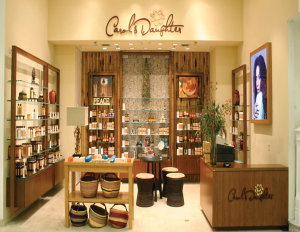(ThyBlackMan.com) The recent news about Black owned beauty/hair care company, Carol’s Daughter, being sold to L’Oreal USA is rife with opinions, both positive and negative, especially from Black people. Some say Lisa Price grew her business to a point where she could no longer support it and did the right thing by selling it. Others say she “sold out” as in being a “sell out.” When I see stories like this I always think about our recent history at it pertains to Black firms being bought by non-Black businesses, one of which was Johnson Products, in 1992.
Lisa Price owned and ran Carol’s Daughter for more than two decades. Like other businesses, operating capital became an issue. Price filed bankruptcy, as many businesses do in order to reorganize. Subsequently the deal was struck with L’Oreal USA. Price is staying with her former company in some capacity, which will help with brand continuity and consistency.
Small businesses are like newborn babies. Their owners take care of them, nurture them, mature them, and then, in many cases, have to let them go. I imagine this is what Price had to face in making her decision to sell her business. Like parents, you don’t hold on for 20 plus years and not have some reluctance to let go.
business. Like parents, you don’t hold on for 20 plus years and not have some reluctance to let go.
History shows that even the largest Black hair care company had to make the same decision in 1998. Soft Sheen Products, founded and operated by Ed Gardner and his family, was also sold to L’Oreal. Prior to that time, in 1987, a Revlon V.P., named Irving Bottner, predicted Black hair care companies would be taken over by White companies in about 15 years. We got mad, but he was right, as other Black hair care giants fell to corporate raiders in the ensuing years,
Now, Carol’s Daughter is another in a long line of Black businesses sold to White and other companies. Motown was sold in 1987 to MCA and Boston Ventures. Essence Magazine was sold to Time Warner; and BET was sold to Viacom. So what’s the problem with the sale of Carol’s Daughter? Is it because it’s a Black hair care business?
[youtube KnZkIxbBKRw]
In 1949, at a Black Beauticians’ convention in Washington, D.C., attendees voiced their concern about Whites pushing their way into the lucrative beauty shop business, “The old line beauticians were losing a long-waged battle to keep the $450,000,000 beauty business in ‘tan hands’…Big laboratories and constant experiment cost money…Whatever the blame, the fact remains that a highly profitable field is surely and not so slowly being taken out of our hands.” Their concerns then are still ours today, 65 years later.
If a 21 year-old firm has to file bankruptcy it is a pretty good indication of a serious cash flow problem. Where will the owner get the money necessary to keep the business open? If the bank is unwilling to lend it, and there is no angel investor at hand, selling is a logical option. The Black haircare industry is now worth several billion dollars; large companies can’t wait to buy smaller successful competitors, especially those that have already established brand loyalty among Black consumers.
L’Oreal’s purchase of Soft Sheen and Carol’s Daughter, while under completely different circumstances, points to a larger issue for Black people. What is our role in the sale of businesses that we support? Many Black folks get upset at these deals, but we never get upset enough to invest in Black companies or provide cash infusions before they are on the ropes. Black investment groups could have a huge impact on small Black businesses—with due diligence, of course—and make a profit at the same time.
Wealthy Black folks could do the same for the larger Black businesses. Motown sold for $61 million and, shortly thereafter, was resold for $325 million. Imagine earning that kind of profit. Soft Sheen sold for $120 million; would you have turned that down? Essence Magazine was sold without even inviting Black Enterprise Magazine to make an offer, according to Earl Graves.
If we want to hold on to Black businesses, we must work together to save them. In 1998, I wrote: “The sale of Soft Sheen and other Black owned firms is merely a sign of the times. In the merger-charged atmosphere that abounds in this country, everyone seems to be forming partnerships and alliances except Black people. Thus, our companies are being devoured by the highest bidders. There is a literal feeding frenzy for the Black dollar. Black people are throwing our dollars to the sharks, and they are getting fat and happy at our expense. The sad part is we continue to do so, even after being insulted by those who benefit from our dollars.”
Let’s stop crying and start buying.
Written By James E. Clingman
Official website; http://www.blackonomics.com/




















Great article and I agree with you. I believe that blacks, wealthy or not, don’t have the unity and/or business sense to buy black businesses. There’s so much backstabbing, mistrust, and ignorance among blacks that its even difficult to get along with one another and that’s just on a social level. Buying/Owning a business means more than making profits and making it rain. It also requires a brain.
Generalities! Generalities! Generalities!
There is a real need to shine light into this area; however, we must get away from generalities when we speak about remedies. You said, “Wealthy Black folks could do the same for the larger Black businesses” and Black investment groups could have a huge impact on small Black businesses—with due diligence…” Who specifically are the wealthy black folks who are willing to invest in blacks businesses and what are the names of their firms or investment groups? I really do want to know. I do not say this in a disparaging way because I know you are a gifted writer and a dedicated soldier in our war for economic freedom. However, come January, we will have endured seven straight years of double-digit unemployment. We just have to start talking in specifics, if there is any hope of convincing reluctant black leaders to draft legislation that will lead to solutions. That is all I am saying! They have to know what to write! Look, we are in a crisis here, as we are literally being tore apart economically as a race. This is no fantasy. This is really, what is happening on the ground in cities across this country. I respect your intellect brother. I do not know about your community but Black on black is beginning to rise in my community. We who have been intellectually gifted and can see the needs of our people really need to come together and agree on talking about specific solutions. In addition, we need to support those specific solutions that have promise. In this way, we drown out and fight back against the charlatans, like Charles Barkley who waste our time and misdirect our good efforts and intentions.
http://www.Jobcreationnow.com
I don’t think we can complain when we don’t support Black businesses. The other problem is not having our own financial and investment institutions to refinance or buy these companies. There is more to the stories about Black companies selling their businesses, but in general, this is about the lack of support within our community.
If we only realize that our power lies in us working together, rather than working separately, we would be unstoppable. That is what we need to focus on, and until we do, we’ll continue to hear stories like this.
Black Unity is the solution, 3ufirst.com is the plan